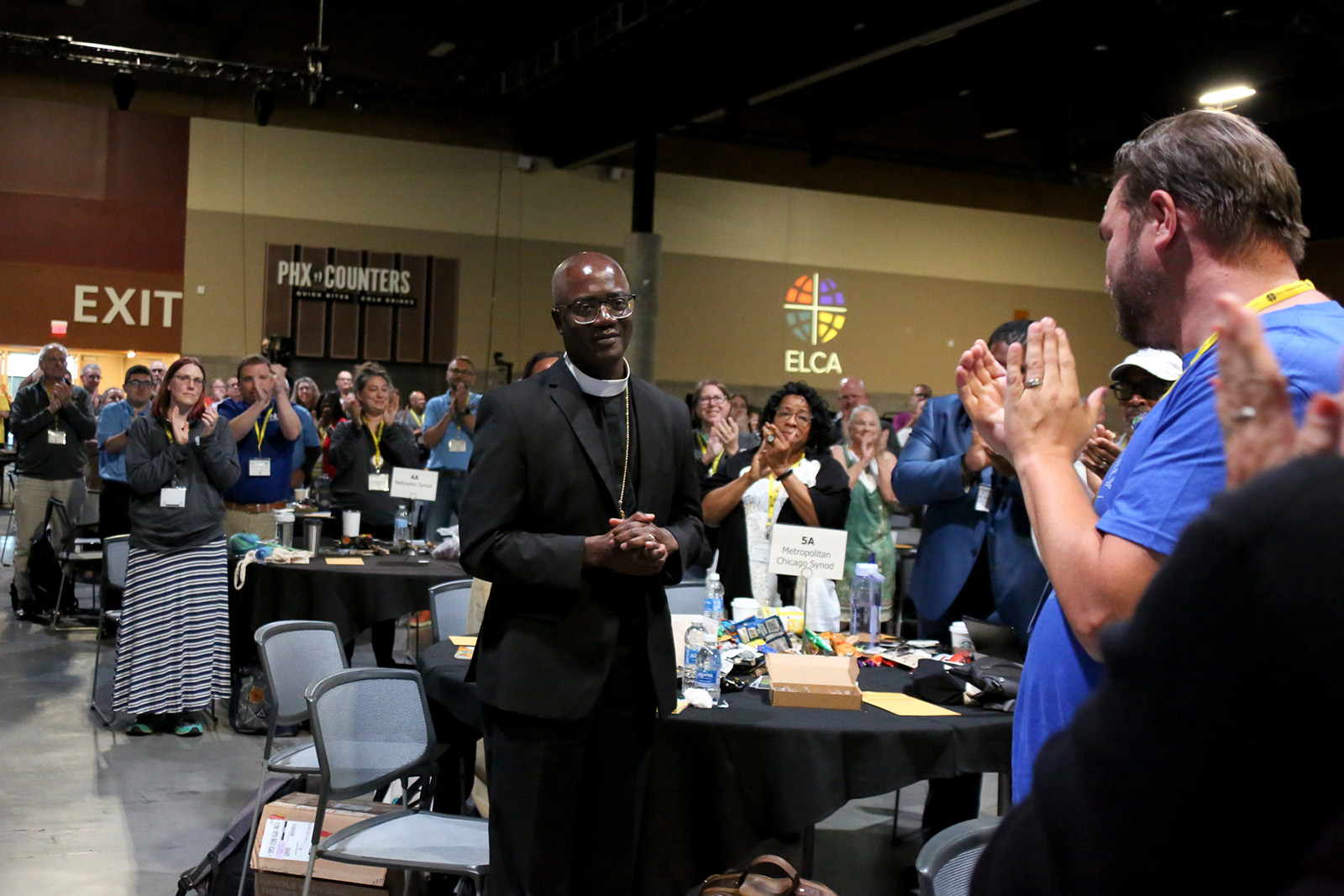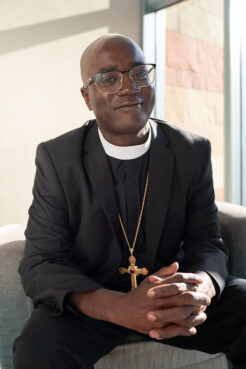
(RNS) — When Yehiel Curry was first asked to become a pastor, his wife shared her thoughts: “I hope you told them no.”
In a story he has often recounted, Curry, a former schoolteacher, would eventually say yes, first becoming a lay minister and later, the ordained pastor of Shekinah Chapel Lutheran Church in Riverdale, Illinois. In that role, he helped the chapel move from a start-up congregation to a full-fledged member church of the Evangelical Lutheran Church in America.
Curry, 53, would eventually become Lutheran bishop of his hometown of Chicago. Then, late last month, he was elected presiding bishop of the ELCA, one of the largest Protestant denominations in the country. He will formally be installed on Oct. 4, at Central Lutheran Church in Minneapolis.
In an interview this week, Curry said that as a young man, he spent years searching for his calling in life — working in sales, as a social worker and eventually as a seventh-grade public school teacher near the former Ida B. Wells Homes housing project on Chicago’s South Side. There, he heard about Camp SIMBA — short for “Safe in My Brothers’ Arms” — a mentoring program and camping ministry focused on helping Black teenagers grow into leaders.
As he got involved in the program — now known as “Rescue, Release and Restore” — Curry said he began to feel what became a calling to the ministry.
“I wasn’t sure how it worked, but I knew that I was being drawn to something,” Curry told RNS at his Metro Chicago Synod office. “I love the fact that the Lutheran Church gave me vocabulary for what I was feeling.”
At Shekinah Chapel, Curry learned about the long, slow process of starting a new congregation. The church grew out of the camping ministry, which began in the early 1990s as a response to racial tensions in the country after the police beating and arrest of Rodney King in Los Angeles. The camp, which focused on pairing Black teenage boys with mentors, ran a summer session, follow-up programs and a worship service during the year.
When the service outgrew St. Stephen’s Lutheran Church, where it had been meeting, the startup congregation moved to Riverdale, to a building that had housed Our Savior’s Lutheran Church. There, Curry and others started a new church — a process some denominations refer to as “replanting.”
As a startup church, Shekinah had many of the assets that new congregations need, such as a core group of young families, a building, vibrant youth outreach and a young, energetic pastor. But that was not enough to gain members, Curry recalled.
“We moved to Riverdale, and I quickly learned that they weren’t impressed with the young families,” said Curry, who went on to earn a Master of Divinity degree in 2013 from the Lutheran School of Theology at Chicago, an ELCA seminary. He began his ministerial training in a program called Theological Education for Emerging Ministries. “They weren’t impressed with our mentoring program. People in Riverdale initially weren’t coming to the church, and I couldn’t figure out why.”

Evangelical Lutheran Church in America Presiding Bishop Yehiel Curry. (Photo courtesy of ELCA)
While serving coffee and doughnuts at a community event, Curry started talking to neighbors and asking if they’d be open to meeting to get know each other. During those meetings, he learned that the sewers in the community had been backing up and flooding homes. That led the church to get involved with local efforts to get the sewers fixed — a process that took years.
“That’s really what I learned as a mission developer — it is not about what you think you’re bringing into the community. It’s who you are in the community. The minute we showed that we cared is really when the community adopted us,” he said. “People don’t care about what you know till they know that you care, and that was the biggest learning for me.”
As presiding bishop, he hopes to spotlight outwardly focused ministries that serve their communities. He said that churches of all kinds, at times, focus so much on what’s happening in their buildings, they don’t recognize what is happening out in the community.
Taking on the new role is bittersweet, he added. He had just been elected to a second term as bishop of the Chicago synod in May and had been busy working with leaders to make a plan for its future. Now, he has to say goodbye to staff and churches that he has come to love.
He hopes to take some of the plans from Chicago to the larger church, in particular the idea that the ministry of the church includes being part of the broader community, he said.
“I’ve wondered, what if God does God’s best work in our going instead of our knowing,” he said. “I’ve been someone who’s been blessed by just taking a step forward.”
Curry, dressed in a black clerical suit, comes across as thoughtful and quietly confident. He said he’s proud of his family, which includes three adult daughters, one of whom is an aspiring minister, and often reminds people that his wife, LaShonda, joined the Lutheran Church before he did.
He also spoke about saying goodbye to his staff, noting that he judges his success in ministry as much by the relationships he makes as ministry outcomes. He sees leadership as a community process — he said yes to the pastorate initially, and to becoming presiding bishop, because his fellow church members asked him to take the role — not because he aspired to it.
And he is aware that many others made it possible for him to become a pastor in the first place. After his election, he gave thanks for church members who supported programs that allowed lay people like himself to start their theological training.
“I was just a guy sitting in the pew,” Curry said, addressing church leaders after his election, noting that it took him two years to say yes to becoming a lay pastor. “When I said yes, your support, this church’s support of that ministry, meant everything.”
Curry said he hopes to bring a collaborative approach to his new role.
“People value things that they can help create,” he told RNS. “When it comes to vision, we have a lot of things that we say are important to us. My job is to bring others along so that the vision is big enough, so that they see themselves in it as well. And I find that when we share the vision, we also are willing to share the burden.”
